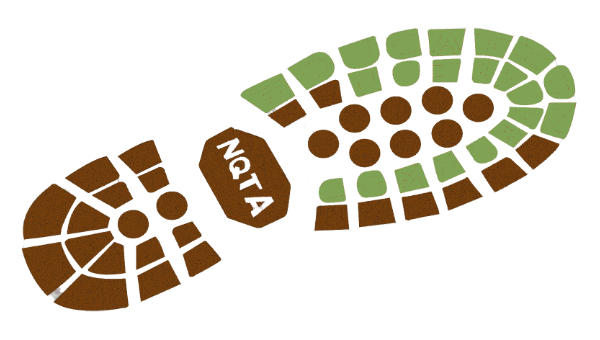North Quabbin Trails Association collaborated with the town of Northfield to restore and improve the Calvin Swan homestead site. The work involved cleaning up the area and creating an easy access trail off the New England National Scenic Trail. Researchers have called attention to the fact that Swan, an African-American, was an accomplished carpenter and community leader in the 19th century. There is an educational kiosk at the site. The following scholarly article about Swan provides more detail.
Who was Calvin Swan?
Historical & Archaeological Interpretation
In the 1800’s there was a thriving community in this mountainous area. The proposed conservation parcel was once the farm and homestead of Calvin T. Swan (1779-1875), a noted freeborn African-American carpenter and sawmill owner in Northfield. Two cellar holes and the well remain on the property which was abandoned in the late 1900’s. The main cellar hole measures about 24’ by 28’. Attached to this hole is a rock outline of another structure, probably a lean-to or shed. The well continues to produce water from a rock enclosure. Another cellar hole, measuring about 10’ by 30’ is nearby.
Betty Congdon, a member of the Northfield Historical Society, has verified that the original Swan deed is the exact acreage of the proposed conservation land. In 2004 Betty Congdon presented a research paper about Calvin Swan at Boston University’s Dublin Seminar for New England Folklife. Her paper will be published this fall by Boston University.
When he was young, Swan served as an ‘apprentice’ to Calvin Stearns, one of the two Stearns brothers who were noted American builders. The Stearns brothers built many of the fine 19th c. homes along Main Street, now on the National Register of Historic Places. Swan and Samuel Dyke built the church in Montague which is now the Montague Grange Hall.
Swan was active in local and regional anti-slavery organizations, serving as secretary of the mountain chapter of the Massachusetts Anti-Slavery Society and as a charter member of the county anti-slavery group in Greenfield. He also served as a trustee of the Methodist church located in the mountain community near Swan’s homestead.
The proposed conservation area is also a few hundred feet from one of Northfield’s historic schools, No. 6, which was established in 1812 and would have educated the Swan children with others in the area. Old school registers indicate that in 1830, for example, 27 students from eleven families plus eight from the Poor House attended school at No. 6.
The Northfield Historical Society is interested in using the site for archaeological exploration and later for historical interpretation. The parcel provides an excellent opportunity to study the relationship of a 19th c. farm to the mountainous landscape in this part of Northfield. There is a potential route for an easy footpath to the home site from the parking area.
Elizabeth A. Congdon, June 21, 2003 – Slavery/Anti-Slavery in New England, The Dublin Seminar for New England Folklife, Deerfield, Massachusetts
